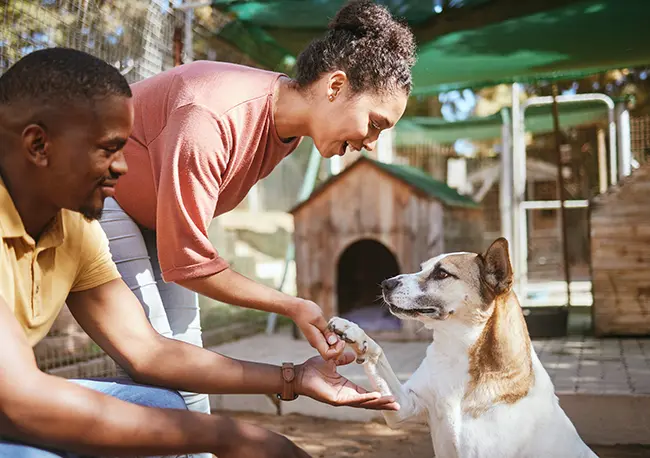
Welcoming a new furry member into your family for companionship is a decision that can bring immense joy to the household. Nonetheless, it’s also a serious responsibility and requires careful consideration. One crucial step in the process is finding a reputable breeder.
Asking the right questions to candidate breeders can help ensure that the puppy you’re bringing home is healthy, well-socialized, and the right fit for your family. To help you out, below are ten questions you should consider asking your potential breeder:
1. Can you share the history and health of the parent dogs?
Knowing the history of your puppy’s parents can give you valuable insights into your new pet’s potential health and behavior. A reputable breeder will have their dogs tested for health issues associated with purebreds. They should willingly provide information about both parent dogs’ health clearances and pedigree.
So, if you want to ensure the parent dogs are healthy, request the necessary health clearances from your potential breeder. Review them carefully to ensure you get the right pet for your family.
2. How long have you been in the dog breeding business?
The breeder’s experience also matters when bringing a pet to your home. Hence, it’s best to ask your potential breeder how long they’ve been breeding.
Typically, quality vetted dog breeders with a long history of breeding dogs will have a wealth of knowledge about the breed’s temperament, health issues, and care needs.
And you can ask the breeder if they’re involved or associated with any dog clubs or dog sports. This can help you determine the level of experience your potential breeder has with the breed you’re interested in.
3. How do you socialize your puppies?
This is another important question you should ask your potential breeder. It’s said that puppies that are well-socialized from a young age tend to grow into well-adjusted, confident adult dogs.
So, inquire about the breeder’s socialization practices, including exposure to various sights, sounds, people, and other animals. Find out if their puppies are comfortable with a household environment. This way, you can ensure that the pet you’re interested in can better adjust to their new surroundings and life after bringing them home.
4. What is your process for screening potential homes?
Reputable breeders want to ensure their puppies go to good homes. Henceforth, asking your potential breeder about their process of screening homes is essential. Ensure they have a thorough screening process, such as home checks or interviews. This can be a good sign that the breeder will take back a dog if a new owner can no longer provide care too.
5. Can I meet the puppies’ parents?

Aside from asking about the health history of the parent dogs, it’s essential to ask if you can meet them in person as well.
Seeing the puppies’ parents can give you a good idea of how your puppy will behave and what it might look like as an adult. During the meeting, observe their behavior, temperament, and physical condition.
On the other hand, if the breeder provides excuses as to why you can’t meet the parents, it can be a red flag that you should be wary of.
6. What vaccinations and veterinary care have the puppies received?
Vaccinations are essential to a puppy’s overall health. As such, you should ask your potential breeder if the puppy you consider has up-to-date vaccinations. This can help you figure out whether the puppy has the proper medical information and the vaccination shots they’ll need in the future.
Remember, the puppies should have received their first vaccinations and deworming before they go to their new homes. So, the breeder should provide documentation of these treatments and their veterinarian’s contact information in case you need to clarify something about the puppy’s medical records.
7. What health guarantees and support do you provide?
There are instances wherein the puppy you’re interested in may have congenital or hereditary conditions. In that case, it’s important to ask your potential breeder about the health guarantees and support they provide for the new pet.
Generally, reputable breeders will offer some form of health guarantee against congenital or hereditary conditions. They’re willing to provide lifelong advice and support for the care of your new dog.
8. How are the puppies weaned and transitioned to solid food?
Bringing a new puppy to your home requires some considerations. One of them is the dog’s transition to solid food. In most cases, a puppy’s transition from mother’s milk to solid food is a crucial stage in their development.
Therefore, make sure to inquire with the breeder if they have a strategic and thoughtful process for this transition. This is to ensure that the puppies are healthy and ready for their new homes.
9. Can you provide references from previous buyers?
Contacting previous buyers can provide firsthand insight into their experience with the breeder and their dogs. So, it’s best to ask your potential breeder if they can provide references from their previous buyers. Once you have the list of references, you can call and ask them about the health and temperament of their dog breeds and their overall satisfaction with the breeder.
However, a breeder who hesitates to provide references can also be a red flag that you should be aware of when dealing with them.
10. Can I visit your facility?
Visiting the facility is essential when dealing with a prospective breeder. By observing the environment in which the puppies are raised, you’ll gain some important clues about the breeder’s practices. These can include cleanliness, access to clean water and food, space for exercise, and a stimulating environment, which are all crucial in knowing whether you should work with the potential breeder.
Conclusion
Having a new puppy in your family and home requires a lot of preparation to ensure they’ll live a happy and healthy life with you. Therefore, if you’re planning to get a new addition to your family, keep the information mentioned above in mind to know what to do when you’re quizzing a puppy breeder candidate. These questions can provide a solid foundation for your discussions with a potential breeder.




